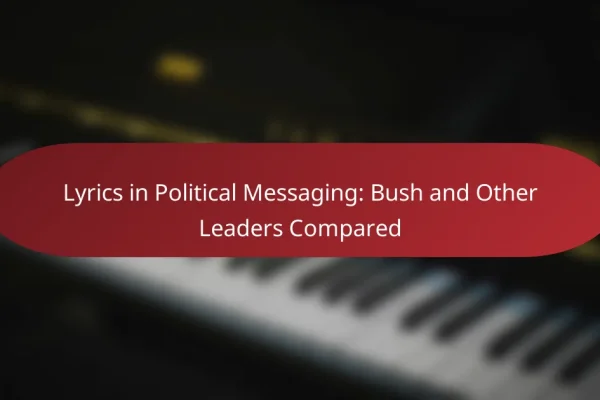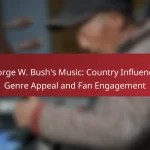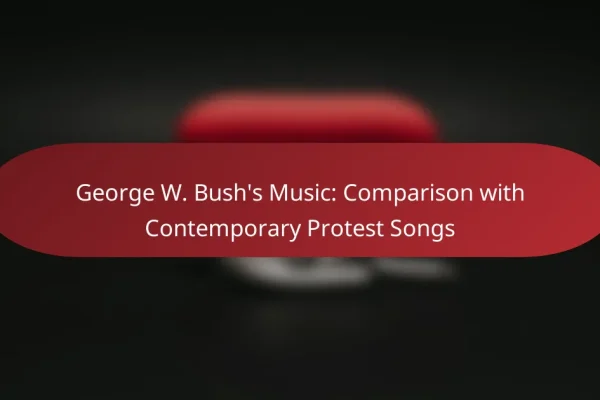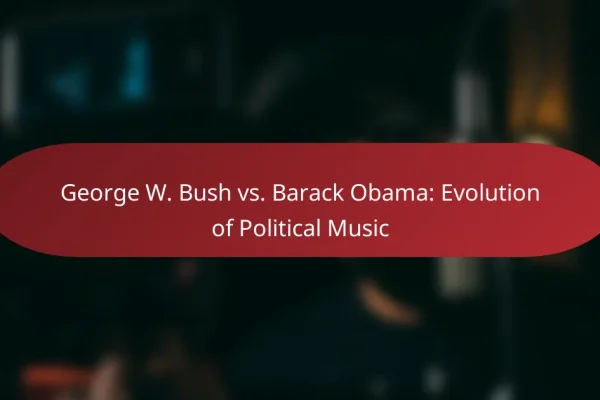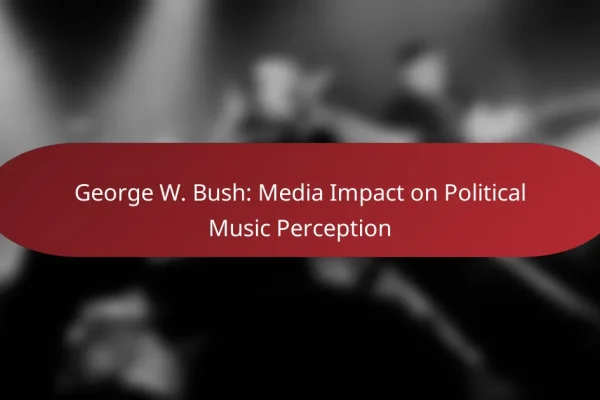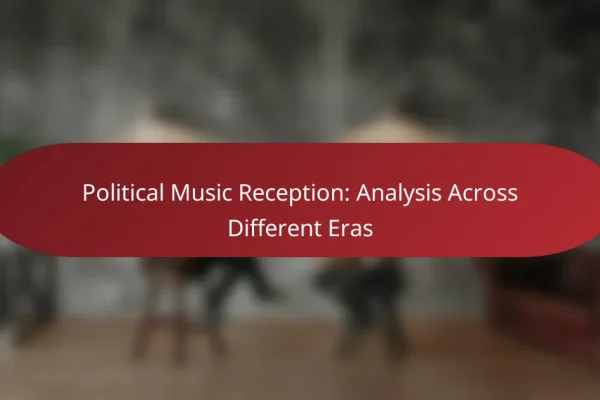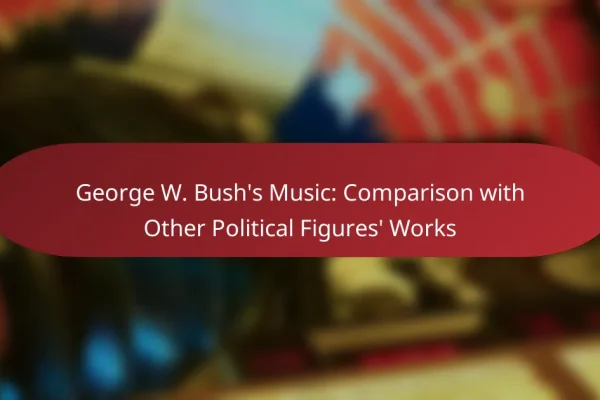What are the key themes in political music?
Political music often revolves around themes that reflect societal issues, movements, and ideologies. Key themes include protest and resistance, social justice, war and peace, environmental activism, and nationalism.
Protest and resistance
Protest and resistance in political music highlight opposition to government policies, social injustices, or oppressive regimes. Artists use their platforms to voice dissent and inspire action among listeners. Songs like “Killing in the Name” by Rage Against the Machine exemplify this theme, urging listeners to challenge authority.
These songs often serve as anthems for movements, rallying people during protests or social upheavals. They can create a sense of solidarity and motivate collective action against perceived injustices.
Social justice and equality
Social justice and equality themes focus on advocating for marginalized groups and addressing systemic inequalities. Artists like Billie Holiday with “Strange Fruit” and Kendrick Lamar with “Alright” address issues of racism, discrimination, and the fight for civil rights. These songs resonate deeply with listeners who seek change.
Political music in this category often raises awareness and fosters dialogue about pressing social issues. It can be a powerful tool for education and mobilization, encouraging listeners to engage in activism and support equitable policies.
War and peace
War and peace themes in political music reflect the human cost of conflict and the desire for harmony. Songs like “Imagine” by John Lennon promote peace and unity, while others like “Fortunate Son” by Creedence Clearwater Revival criticize the inequities of war. These tracks often provoke thought about the consequences of military actions.
Artists use their music to comment on current conflicts, urging listeners to consider the implications of war and the importance of diplomacy. This theme can inspire movements for peace and reconciliation in various contexts.
Environmental activism
Environmental activism in political music addresses climate change, conservation, and the protection of natural resources. Artists like Joni Mitchell with “Big Yellow Taxi” and Billie Eilish with “All the Good Girls Go to Hell” highlight the urgency of environmental issues. Their songs encourage listeners to take action for a sustainable future.
This theme often emphasizes the interconnectedness of humanity and the planet, urging collective responsibility. Political music can galvanize support for environmental policies and inspire grassroots movements for change.
Nationalism and identity
Nationalism and identity themes explore cultural pride, heritage, and the complexities of national identity. Songs like “Born in the U.S.A.” by Bruce Springsteen reflect on American identity, while others may critique nationalism’s darker aspects. These tracks can evoke strong emotions and foster a sense of belonging among listeners.
Political music in this category often serves to unite people around shared values and experiences. However, it can also spark debates about nationalism’s role in society and the balance between pride and exclusion.
How does political music influence social movements?
Political music plays a significant role in shaping social movements by raising awareness, mobilizing supporters, and shaping public opinion. Through its emotional resonance and cultural relevance, it can effectively communicate messages and inspire collective action.
Raising awareness
Political music raises awareness by highlighting social issues and injustices that may otherwise go unnoticed. Songs often serve as a rallying cry, bringing attention to causes such as civil rights, environmental concerns, or economic inequality.
For example, artists like Bob Dylan and Public Enemy have used their music to shed light on critical societal issues, prompting listeners to engage with these topics. This awareness can lead to increased public discourse and motivate individuals to seek change.
Mobilizing supporters
Political music can mobilize supporters by fostering a sense of community and shared purpose among listeners. Anthems and protest songs often become synonymous with movements, encouraging people to unite and participate in demonstrations or campaigns.
For instance, songs like “We Shall Overcome” have historically galvanized civil rights activists, creating a powerful collective identity. Engaging with music that resonates with their beliefs can inspire individuals to take action and join the movement.
Shaping public opinion
Political music influences public opinion by framing issues in a way that resonates emotionally with audiences. Lyrics can challenge prevailing narratives and encourage listeners to reconsider their views on various topics.
Artists like Kendrick Lamar and Joan Baez have used their platforms to address complex social issues, prompting discussions that can shift public perceptions. The emotional impact of music can make political messages more relatable and persuasive, ultimately affecting how society views certain movements or policies.
Which artists are known for political music in the US?
Several artists in the US have gained recognition for their political music, using their platforms to address social issues and inspire change. Notable figures include Bob Dylan, Public Enemy, Rage Against the Machine, and Lady Gaga, each contributing uniquely to the political landscape through their lyrics and performances.
Bob Dylan
Bob Dylan is often regarded as a pioneer of political music, particularly during the 1960s. His songs, such as “Blowin’ in the Wind” and “The Times They Are a-Changin’,” encapsulated the sentiments of the civil rights movement and anti-war protests.
Dylan’s ability to weave complex social issues into poetic lyrics has made his work timeless. His influence continues to resonate, inspiring new generations of artists to address political themes in their music.
Public Enemy
Public Enemy emerged in the late 1980s as a powerful voice in hip-hop, focusing on issues like racial inequality and social justice. Their album “It Takes a Nation of Millions to Hold Us Back” is a landmark in political music, featuring tracks that challenge systemic oppression.
The group’s aggressive style and thought-provoking lyrics encourage listeners to confront uncomfortable truths about society. Public Enemy’s activism extends beyond music, as they engage in community outreach and education initiatives.
Rage Against the Machine
Rage Against the Machine is known for their fusion of rock and rap, delivering a strong anti-establishment message through their music. Songs like “Killing in the Name” and “Bulls on Parade” critique capitalism, war, and government corruption.
The band’s energetic performances and politically charged lyrics have made them icons of protest music. They often use their platform to advocate for various causes, including labor rights and environmental justice.
Lady Gaga
Lady Gaga has used her music and public persona to advocate for [censured] rights and mental health awareness. Her song “Born This Way” became an anthem for acceptance and self-love, promoting messages of equality and diversity.
Gaga’s activism extends beyond her music; she frequently engages in philanthropic efforts and speaks out on social issues. Her influence highlights the role of pop culture in shaping political discourse and encouraging social change.
How does political music vary across different cultures?
Political music varies significantly across cultures, reflecting unique social, historical, and political contexts. Each culture uses music as a tool for expression, mobilization, and commentary, leading to diverse styles and messages.
Regional influences
Regional influences shape the sound and themes of political music. For instance, in Latin America, genres like salsa and cumbia often incorporate political messages related to social justice and resistance. In contrast, African political music frequently uses traditional rhythms and instruments to address issues like colonialism and governance.
In Europe, folk music has been a medium for political expression, particularly in countries like Ireland and Spain, where songs reflect national identity and struggles for independence. The specific regional context can dictate the style, instrumentation, and lyrical content of political music.
Historical context
Historical context plays a crucial role in the development of political music. For example, during the civil rights movement in the United States, genres like gospel and folk were pivotal in conveying messages of equality and freedom. Similarly, the anti-apartheid movement in South Africa saw the rise of music that united people against oppression.
Understanding the historical backdrop allows listeners to appreciate the significance of certain songs and their impact on social movements. Political music often emerges in response to specific events, making it a reflection of the times.
Language and expression
Language and expression in political music vary widely, influencing how messages are conveyed. Lyrics in local dialects or languages can resonate more deeply with audiences, as seen in the use of indigenous languages in protest songs. This connection can enhance the emotional weight of the music and its message.
Moreover, the choice of language can affect the accessibility of political music. Songs in widely spoken languages, like English or Spanish, may reach broader audiences, while those in less common languages may foster a sense of community among specific groups. The nuances of language also shape the lyrical content, allowing for diverse forms of expression.
What are the most impactful political songs of the 21st century?
The most impactful political songs of the 21st century resonate deeply with social issues and movements, often sparking conversations and actions. These tracks address themes of inequality, injustice, and resistance, making them significant cultural artifacts.
This Is America by Childish Gambino
<p"This Is America" critiques systemic racism and gun violence in the United States. The song's stark visuals and contrasting musical styles highlight the dissonance between American culture and its darker realities.
Listeners are encouraged to reflect on the juxtaposition of joy and despair, as the upbeat melody contrasts sharply with the serious themes. The song serves as a powerful commentary on the complexities of American identity.
Fight the Power by Public Enemy
<p"Fight the Power" remains a rallying cry against racial oppression and social injustice. Originally released in the late 20th century, its resurgence in the 21st century underscores its ongoing relevance in contemporary movements like Black Lives Matter.
The song’s aggressive tone and assertive lyrics empower listeners to challenge authority and demand change. Its impact is amplified through its use in various media, reinforcing its message across generations.
Alright by Kendrick Lamar
<p"Kendrick Lamar's "Alright" has become an anthem of hope and resilience amidst adversity. The song captures the struggles faced by the Black community while instilling a sense of optimism and determination.
The repeated refrain “We gon’ be alright” serves as a mantra for those fighting against systemic inequality. Its widespread use in protests illustrates how music can unify and inspire collective action for social justice.
